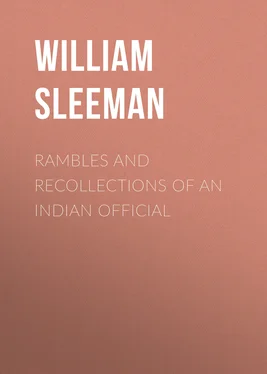William Sleeman - Rambles and Recollections of an Indian Official
Здесь есть возможность читать онлайн «William Sleeman - Rambles and Recollections of an Indian Official» — ознакомительный отрывок электронной книги совершенно бесплатно, а после прочтения отрывка купить полную версию. В некоторых случаях можно слушать аудио, скачать через торрент в формате fb2 и присутствует краткое содержание. Жанр: Путешествия и география, История, foreign_edu, foreign_antique, foreign_prose, на английском языке. Описание произведения, (предисловие) а так же отзывы посетителей доступны на портале библиотеки ЛибКат.
- Название:Rambles and Recollections of an Indian Official
- Автор:
- Жанр:
- Год:неизвестен
- ISBN:нет данных
- Рейтинг книги:4 / 5. Голосов: 1
-
Избранное:Добавить в избранное
- Отзывы:
-
Ваша оценка:
- 80
- 1
- 2
- 3
- 4
- 5
Rambles and Recollections of an Indian Official: краткое содержание, описание и аннотация
Предлагаем к чтению аннотацию, описание, краткое содержание или предисловие (зависит от того, что написал сам автор книги «Rambles and Recollections of an Indian Official»). Если вы не нашли необходимую информацию о книге — напишите в комментариях, мы постараемся отыскать её.
Rambles and Recollections of an Indian Official — читать онлайн ознакомительный отрывок
Ниже представлен текст книги, разбитый по страницам. Система сохранения места последней прочитанной страницы, позволяет с удобством читать онлайн бесплатно книгу «Rambles and Recollections of an Indian Official», без необходимости каждый раз заново искать на чём Вы остановились. Поставьте закладку, и сможете в любой момент перейти на страницу, на которой закончили чтение.
Интервал:
Закладка:
A child of one of our servants was one day in convulsions from its sufferings in cutting its teeth. The Civil Surgeon happened to call that morning, and he offered to lance the child's gums. The poor mother thanked him, but stated that there could be no possible doubt as to the source of her child's sufferings—that the devil had got into it during the night, and would certainly not be frightened out by his little lancet; but she expected every moment my old tent- pitcher, whose exorcisms no devil of this description had ever yet been able to withstand.
The small-pox had been raging in the town of Jubbulpore for some time during one hot season that I was there, and a great many children had died from it. The severity of the disease was considered to have been a good deal augmented by a very untoward circumstance that had taken place in the family of the principal banker of the town, Khushhāl Chand. Sēwā Rām Sēth, the old man, had lately died, leaving two sons. Ram Kishan, the eldest, and Khushhāl Chand, the second. The eldest gave up all the management of the sublunary concerns of the family, and devoted his mind entirely to religious duties. They had a very fine family temple of their own, in which they placed an image of their god Vishnu, cut out of the choicest stone of the Nerbudda, and consecrated after the most approved form, and with very expensive ceremonies. This idol Rām Kishan used every day to wash with his own hands with rosewater, and anoint with precious ointments. One day, while he had the image in his arms, and was busily employed in anointing it, it fell to the ground upon the stone pavement, and one of the arms was broken. To live after such an untoward accident was quite out of the question, and poor Rām Kishan proceeded at once quietly to hang himself. He got a rope from the stable, and having tied it over the beam in the room where he had let the god fall upon the stone pavement, he was putting his head calmly into the noose, when his brother came in, laid hold of him, called for assistance, and put him under restraint. A conclave of the priests of that sect was immediately held in the town, and Rām Kishan was told that hanging himself was not absolutely necessary; that it might do if he would take the stone image, broken arm and all, upon his own back, and carry it two hundred and sixty miles to Benares, where resided the high priest of the sect, who would, no doubt, be able to suggest the proper measures for pacifying the god.
At this time, the only son of his brother, Khushhāl Chand, an interesting little boy of about four years of age, was extremely ill of the small-pox; and it is a rule with Hindoos never to undertake any journey, even one of pilgrimage to a holy shrine, while any member of the family is afflicted with this disease; they must all sit at home clothed in sackcloth and ashes. He was told that he had better defer his journey to Benares till the child should recover; but he could neither sleep nor eat, so great was his terror, lest some dreadful calamity should befall the whole family before he could expiate his crime, or take the advice of his high priest as to the best means of doing it: and he resolved to leave the decision of the question to God Himself. He took two pieces of paper, and having caused Benares to be written upon one, and Jubbulpore upon the other, he put them both into a brass vessel. After shaking the vessel well, he drew forth that on which Benares had been written. 'It is the will of God,' said Rām Kishan. All the family, who were interested in the preservation of the poor boy, implored him not to set out, lest Dēvī, who presides over small-pox, should become angry. It was all in vain. He would set out with his household god; and, unable to carry it himself, he put it into a small litter upon a pole, and hired a bearer to carry it at one end, while he supported it at the other. His brother, Khushhāl Chand, sent his second wife at the same time with offerings for Dēvī, to ward off the effects of his brother's rashness from his child. By the time the brother had got with his god to Adhartāl, three miles from Jubbulpore, on the road to Benares, he heard of the death of his nephew; but he seemed not to feel this slight blow in his terror of the dreadful but undefined calamity which he felt to be impending over him and the whole family, and he trotted on his road. Soon after, an infant son of their uncle died of the same disease; and the whole town became at once divided into two parties—those who held that the children had been killed by Dēvī as a punishment for Rām Kishan's presuming to leave Jubbulpore before they recovered; and those who held that they were killed by the god Vishnu himself, for having been so rudely deprived of one of his arms. Khushhāl Chand's wife sickened on the road, and died on reaching Mirzapore, of fever; and, as Dēvī was supposed to have nothing to do with fevers, this event greatly augmented the advocates of Vishnu. It is a rule with the Hindoos to bury, and not to burn, the bodies of those who die of the small-pox; 'for', say they, 'the small-pox is not only caused by the goddess Dēvī, but is, in fact, Dēvī herself ', and to burn the body of the person affected with this disease is, in reality, neither more nor less than to burn the goddess '.
Khushhāl Chand was strongly urged to bury, and not burn, his child, particularly as it was usual with Hindoos to bury infants and children of that age, of whatever disease they might die; but he insisted upon having his boy burned with all due pomp and ceremony, and burned he was accordingly. From that moment, it is said, the disease began to rage with increased violence throughout the town of Jubbulpore. At least one-half of the children affected had before survived; but, from that hour, at least three out of four died; and, instead of the condolence which he expected from his fellow citizens, poor Khushhāl Chand, a very amiable and worthy man, received nothing but their execrations for bringing down so many calamities upon their heads; first, by maltreating his own god, and then by setting fire to theirs.
I had, a few days after, a visit from Gangādhar Rāo, the Sadar Amīn, or head native judicial officer of this district, whose father had been for a short time the ruler of the district, under the former government; and I asked him whether the small-pox had diminished in the town since the rains had now set in. He told me that he thought it had, but that a great many children had been taken off by the disease. 328
'I understand, Rāo Sahib, that Khushhāl Chand, the banker, is supposed to have augmented the virulence of the disease by burning his boy; was it so?'
'Certainly,' said my friend, with a grave, long face; 'the disease was much increased by this man's folly.' I looked very grave in my turn, and he continued:– 'Not a child escaped after he had burned his boy. Such incredible folly! To set fire to the goddess in the midst of a population of twenty thousand souls; it might have brought destruction on us all!'
'What makes you think that the disease is itself the goddess?'
'Because we always say, when any member of a family becomes attacked by the small-pox, " Dēvī nikalī ", that is, Dēvī has shown herself in that family, or in that individual. And the person affected can wear nothing but plain white clothing, not a silken or coloured garment, nor an ornament of any kind; nor can he or any of his family undertake a journey, or participate in any kind of rejoicings, lest he give offence to her. They broke the arm of their god, and he drove them all mad. 329The elder brother set out on a journey with it, and his nephew, cousin, and sister-in-law fell victims to his temerity; and then Khushhāl Chand brings down the goddess upon the whole community by burning his boy! 330No doubt he was very fond of his child—so we all are—and wished to do him all honour; but some regard is surely due to the people around us, and I told him so when he was making preparations for the funeral; but he would not listen to reason.'
Читать дальшеИнтервал:
Закладка:
Похожие книги на «Rambles and Recollections of an Indian Official»
Представляем Вашему вниманию похожие книги на «Rambles and Recollections of an Indian Official» списком для выбора. Мы отобрали схожую по названию и смыслу литературу в надежде предоставить читателям больше вариантов отыскать новые, интересные, ещё непрочитанные произведения.
Обсуждение, отзывы о книге «Rambles and Recollections of an Indian Official» и просто собственные мнения читателей. Оставьте ваши комментарии, напишите, что Вы думаете о произведении, его смысле или главных героях. Укажите что конкретно понравилось, а что нет, и почему Вы так считаете.












